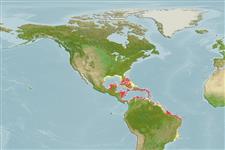Common names from other countries
Classification / Names / Names
народные названия | синонимы | Catalog of Fishes (gen., sp.) | ITIS | CoL | WoRMS
Environment: milieu / climate zone / depth range / distribution range
экология
донно-пелагический; пределы глубины 0 - 25 m (Ref. 97531), usually 0 - 5 m. Tropical
Western Atlantic: USA to Brazil.
Length at first maturity / Size / Вес / Возраст
Maturity: Lm ? range ? - ? cm Max length : 14.2 cm WD самец/пол неопределен; (Ref. 367); 9.5 cm WD (female)
Carapace slightly more than twice as broad as long; 9 teeth on arched anterolateral margin (outer orbital tooth and strong lateral spine included), second to eighth usually trending forward, without shoulders, anterior margins concave except first 2; front (excluding outer orbital angles) bearing 4 teeth, inner pair small but definitely formed. Anterior half of convex dorsal surface coarsely granulate, variably finer and more numerous granules on posterior on posterior part and in transverse lines; central trapezoidal (metagastric) area short and wide (anterior width about 2.4 times, posterior width about 1.5 times length). Pincers dissimilar, ridged longitudinally, fingers compressed but broadened dorsoventrally producing pointed spatulate shape; fifth legs flattened in form fifth legs flattened in form of paddles. Male with T-shaped abdomen reaching slightly beyond suture between thoracic sternites 4 and 5, sixth segment nearly parallel-sided but broadened proximally; first pleopods short, reaching about midlength of sternite 7, approximately each other or occasionally overlapping at level of abrupt curve beyond which short terminal part tapers to rather sharp tip; armed with minute scattered retrogressive spinules distally. Color: carapace brown with areas of bluish black. Chelae brown above; fingers dark on external face except for tips and proximal portion, internal face dark in distal 2/3; dark color of fingers retained in preservation.
Life cycle and mating behavior
половая зрелость | размножение | нерест | икра | Fecundity | личинки
Members of the order Decapoda are mostly gonochoric. Mating behavior: Precopulatory courtship ritual is common (through olfactory and tactile cues); usually indirect sperm transfer.
Основная ссылка
ссылки | координатор | соавторы
Tavares, M. 2003. (Ref. 367)
Статус Красного Списка МСОП (Ref. 130435: Version 2024-1)
Статус СИТЕС (Ref. 108899)
Not Evaluated
Not Evaluated
Использование человеком
рыболовство: не имеет хозяйственного значения
| FishSource |
инструменты
дополнительная информация
Возраст/РазмерыростЗависимость между длиной и массой телаЗависимость между длинамиморфологияличинкичисленность
ресурсы в Интернет
Estimates based on models
Preferred temperature
(Ref.
115969): 26.3 - 28.2, mean 27.4 (based on 546 cells).
Уязвимость
Low vulnerability (10 of 100).
